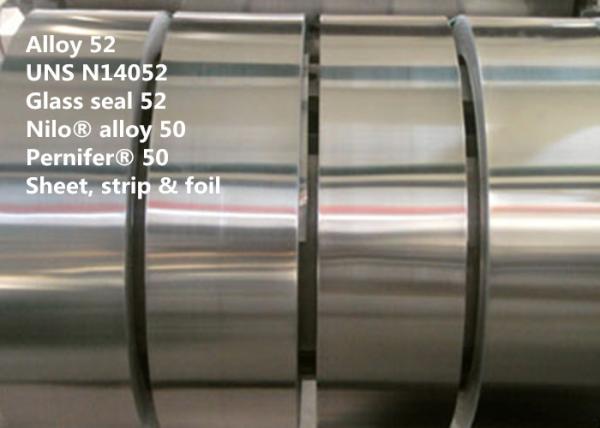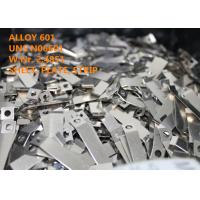Glass Seal 52 Nickel Iron Alloy Bar / Strip For Hermetic And
Electronic Tube
1 EQUIVALENT DESIGNATION
UNS N14052, Glass seal 52, Nilo® alloy 50, Pernifer 50
2 PRODUCT
Nickel iron alloy 52 (UNS N14052, Glass seal 52) bar, tube, strip,
foil, wire for hermetic and electronic tube.
Alloy 52 is available in following standard semi-finished forms:
Sheet & plate
Delivery condition: Hot or cold rolled, heat treated, descaled or
pickled
Strip & foil
Delivery condition: Cold rolled, heat treated, pickled or bright
annealed
Bar and rod
Delivery condition: Forged, rolled, drawn, heat treated, oxidized,
descaled or pickled, turned, peeled, ground or polished
Wire (profile, round, flats, square)
Delivery condition: Drawn bright, ¼ hard to hard, bright annealed
in rings, containers, on spools and headstocks
Wire rod
Delivery condition: hot rolled (dia.5.5mm to 40mm)
Others
Other shapes and dimensions such as discs, rings, seamless pipes
and forgings can be requested.
3 OVERVIEW
Alloy 52 is a binary nickel-iron controlled expansion alloy
containing 50.5% nickel, used in both for its controlled expansion
characteristics as well as it’s magnetic shielding capabilities. It
is an alloy developed for glass-to-metal seals for some of the soft
glasses and some ceramics. It exhibits low thermal expansion
properties. Due to a higher content of Nickel than its other Nickel
Iron family members, it also exhibits good magnetic properties.The
alloy’s rate of thermal expansion is virtually constant to a
temperature of about 1050°F (565°C).
With the addition of Iron, Alloy 52 is more durable than Nickel by
itself and exhibits good machining properties.
4 APPLICATION
Alloy 52 is commonly used in the semiconductor and
telecommunications industry, mainly used for metal to glass, and
ceramic to glass sealing for electronic tubes, automotive and
industrial lamps, and specialty hermetic devices, mercury-wetted
reed switches, magnetic reed switches and seals that need
controlled linear expansion to approximately 977°F (525°C).
5 CHEMICAL COMPOSITION (wt%):
| Ni | Fe | Al | Co | Mn | Si | C | P | S | Cr |
| 50.5 | Balance | ≤0.10 | ≤0.50 | ≤0.60 | ≤0.30 | ≤0.05 | ≤0.025 | ≤0.025 | ≤0.25 |
6 PHYSICAL PROPERTY
| Density | lb/cu in | 0.30 |
| Specific Gravity | g/cm3 | 8.30 |
| Curie Temp | °F | 986 |
| °C | 530 |
| Melting Point | °F | 2600 |
| °C | 1427 |
| Electrical Resistivity | Micro-ohm-cm | 44 |
| ohm-cir mil/ft | 258 |
| Thermal Conductivity | W/cm °C | 0.14 |
| BTU-in/sq. ft-hr- | 97 |
| Specific Heat | Cal/g- °C | 0.12 |
| BTU/lbm- °F | 0.12 |
| Thermal Expansion | ppm / °F (75°F to 842°F) | 5.5 |
| ppm / °C (25°C to 450°F) | 9.9 |
| Modules of Elasticity | Mpsi | 23 |
| kMPa | 159 |
Linear coefficient of thermal expansion
| Degree C | Coefficient | Degree C | Coefficient |
| 30-100 | 10.5 | 30-450 | 9.6 - 10.7 |
| 30-150 | 10.5 | 30-475 | 10.1 |
| 30-200 | 10.4 | 30-500 | 10 |
| 30-250 | 10.4 | 30-525 | 10.4 |
| 30-300 | 10.2 | 30-550 | 10.2 - 10.7 |
| 30-325 | -- | 30-600 | 10.8 |
| 30-350 | 10.2 | 30-700 | 11.7 |
| 30-375 | -- | 30-800 | 12.5 |
| 30-400 | 10.1 | 30-900 | 13.3 |
| 30-425 | -- | 30-1000 | 14.2 |
7 MECHANICAL PROPERTIES
Typical mechanical properties of Alloy 52 in annealed condition
| Tensile strength | ksi | 80 |
| MPa | 552 |
| Yield strength | ksi | 40 |
| MPa | 276 |
| Elongation | % in 2 in. | 35 |
| Typical hardness | Rockwell HRB | 80 |
8 WORKING INSTRUCTION
Alloys 52 can be hot or cold worked, machined and formed by
processes similar to those used for austenitic stainless steels.
Heat treatment
Although the nickel-iron low expansion alloys are not hardenable,
annealing and stress relief thermal treatments are at times
necessary to promote structure uniformity and dimensional
stability. The relief of stresses introduced by severe forming,
bending, or machining, can be accomplished by annealing at
temperatures of approximately 1400 to 1800°F (760 to 982°C) for a
time sufficient, to thoroughly heat through the section. However,
the nickel-irons will oxidize readily at these high temperatures.
When annealing cannot be done in a non-oxidizing enviroment
(vacuum, dry hydrogen, dissociated ammonia, etc.) sufficient
material must be allowed on work pieces to clean-up by light
grinding, pickling, etc., after annealing. Stress relief for
sections having light finishing cuts or grinding performed after
annealing is accomplished by heating to 600 to 800°F (316 to
427°C), for a time to uniformly heat through the work piece.
Forming
All of the nickel-iron controlled expansion alloys can be hot
forged, upset, formed, etc., at temperatures between 1800 to 2100°F
(982 to 1149°C). However, heating for hot working must be done
uniformly at slow rates from relatively cold furnaces (black) to
minimize the potential for cracking through large sections as a
result of differential thermal expansion stresses. Large forgings
should be annealed to promote uniformity after hot working.
Machining
The alloy should be machined in the annealed condition, using high
speed steel or tungsten carbide tipped tools. Cutting compounds
should be straight cutting oil E.P. medium duty, or soluble oil
20:1 dilution for turning, drilling and milling. Lower dilution
ratios should be used for other machining methods.
The following feeds and speeds can be used as a general guide:
| Cutting Speed | Feed |
Rough turning
depth of cut
1.25-2.5 mm
(0.05-0.10 inch) | 30-45 m/min
(98-148 ft/min) | 0.25-0.4 mm/rev
(0.01-0.015 in/rev) |
Finish turning,
depth of cut
0.125-0.25 mm
(0.005-0.010 inch) | 45-60 m/min
(148-197ft/min) | 0.1-0.25 mm/rev
(0.0004-0.01 mm/rev) |
9 STANDARD SPECIFICATION
ASTM F-30 Sheet, strip, rod, bar, tubing and wire
MIL 1-23011 Class 2
AMS 1-23011 Class 2
10 COMPETITIVE ADVANTAGE:
(1) More than 50 years experience of research and develop in high
temperature alloy, corrosion resistance alloy, precision alloy,
refractory alloy, rare metal and precious metal material and
products.
(2) 6 state key laboratories and calibration center.
(3) Patented technologies.
(4) Ultra-purity smelting process: VIM + IG-ESR + VAR
(5) Excellent high performance.
11 BUSINESS TERM
| Minimum order quantity | Negotiable |
| Price | Negotiable |
| Packing details | Water prevent, seaworthy transport, mill’s export standard packing |
| Mark | As per order |
| Delivery time | 60-90 days |
| Payment terms | T/T, L/C at sight, D/P |
| Supply ability | 300 metric tons / Month |












